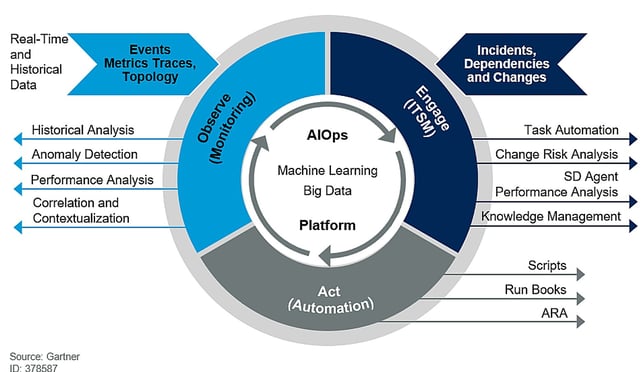Everywhere we look, data is increasing in volume and complexity. Businesses are looking for new ways to take advantage of this valuable resource and enhance the speed and accuracy of decision-making. Technological innovations drive businesses to evolve, so IT operations teams face several challenges. IT teams need to keep up with rapid changes in technology. They also struggle to meet business teams’ high expectations for the quick resolution of service and reliability issues. To enable digital transformation, organizations must change the way they think about traditional IT. They must consider it an integral part of an organization’s brand rather than treating it as a cost center.
We can already see the impact of artificial intelligence (AI) in business functions such as marketing, procurement, customer service, and manufacturing. Now, businesses are combining big data, AI, and machine learning (ML) to enhance and partially replace a broad range of IT functions. This makes it possible to revamp traditional IT operations into artificial intelligence operations (AIOps) that can handle performance monitoring, data health analysis, service management, and more.
What is AIOps?
AIOps means performing IT operations with the help of artificial intelligence (AI). AIOps platforms leverage big data, collecting information from multiple IT tools and devices to automatically spot and react to real-time issues while still providing traditional historical analytics.
The potential automation of IT operations, according to management consulting firm Gartner:

Figure 1: AIOps Platform Enabling Continuous Insights Across Operations1
AIOps aims to move away from siloed data to aggregate observational data like job logs that have engagement points like tickets, incidents, and event management. Implementing comprehensive analytics and machine learning strategies on data enables automation-driven insights that provide continuous improvements and better performance.
AIOps acts as a force multiplier, allowing teams to spend less time firefighting and more time building new technology capabilities for the organization.
Business Use Cases for AIOps
Using AIOps to transform IT operations into a service-oriented model can provide a variety of tangible benefits, including cost optimization, risk mitigation, and deeper insight into the customer experience. The following factors drive organizations to consider AIOps for more responsive service models:
- IT environments are exceeding human scale: Traditional IT Ops can no longer handle the data and process complexity through offline and manual intervention. Companies must move to a highly automated environment to track and manage the complexity that comes with IT Ops.
- Exponential increase in data: The sheer volume of data to be managed and retained in IT Ops is ever-increasing and becoming too complex for manual reporting and analysis.
- Quick handling of infrastructure issues: With organizations digitizing their businesses, reaction time to infrastructure issues has decreased significantly, particularly when the issues impact user experience.
- Need for a predictive approach: Finding and fixing incidents after they occur no longer works for organizations due to prolonged downtime. Predicting issues and getting ahead of problems is a key component of digital transformation.
- Siloed nature of traditional IT service management: While the information technology infrastructure library (ITIL) model has worked well in the past, it has led to the creation of silos within service management, with each functional area working according to its own set of goals and tools.
- Global IT services across business units: Organizations that operate globally face challenges in provisioning IT services for their entire business unit. Issues and problems vary from region to region, and manual IT operations face difficulties in providing for local issues.
While there is a burning need to change the way IT operations occur, AIOps is targeted toward building new skills in personnel rather than replacing the manual effort completely.
If AIOps can bring so much value to organizations, why aren’t they all taking on this digital transformation? The idea of a real step function improvement for an organization is energizing and empowering. However, leaders are still sceptical about making a significant investment in IT for fear of it being underutilized. The failure to see concrete results from analytics and ML initiatives and the connection to real, measurable problems makes organizations wary of stepping into the much-hyped AI/ML arena.
Take an Incremental Approach to AIOps
To reduce speculation and scepticism around transforming entire IT operations in one go, Axtria proposes an incremental approach. AI has already made inroads in pharmaceutical manufacturing and marketing. Now, data operations in the pharma industry face a sea change. Axtria has helped customers transform their operations by bringing in ML-driven root cause analysis, outlier detection algorithms, and predictive analytics.

Figure 2: Incremental Approach to AIOps
The first steps in building analytics that smooth data operations are validating the data, monitoring its quality, and ensuring the data is trusted. Axtria’s Data Operations mechanism is supported by robust data quality frameworks, which help in implementing AIOps successfully.
Key Business Benefits of AIOps
- Faster insights into IT operations for remediation and further automation
- Reduced cost of operations
- Transparency leading to more control
- Data-driven business decisions in operations
- Eliminates human error and data noise with robust preemptive and responsive IT infrastructure
AIOps can dramatically improve IT operations teams’ ability to partner effectively with other business units. Introducing AIOps to service management can proactively identify potential issues with services and technology before they become problems. An AIOps-enabled future helps customers innovate and elevate quickly by embracing intelligent mechanisms in the ever-changing data landscape.
REFERENCES
- Rich C, Prasad P, Ganguli S. Market guide for AIOps platforms [Internet]. Stamford: Gartner; 2019 Nov 7 [cited 2022 Dec 12]. 1 p. Available from https://www.gartner.com/en/documents/3971186/market-guide-for-aiops-platforms
.jpg?width=190&height=190&name=A1390_Megha%20Kapadia%20(2).jpg)



